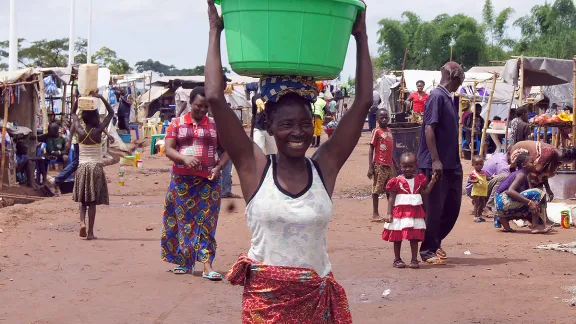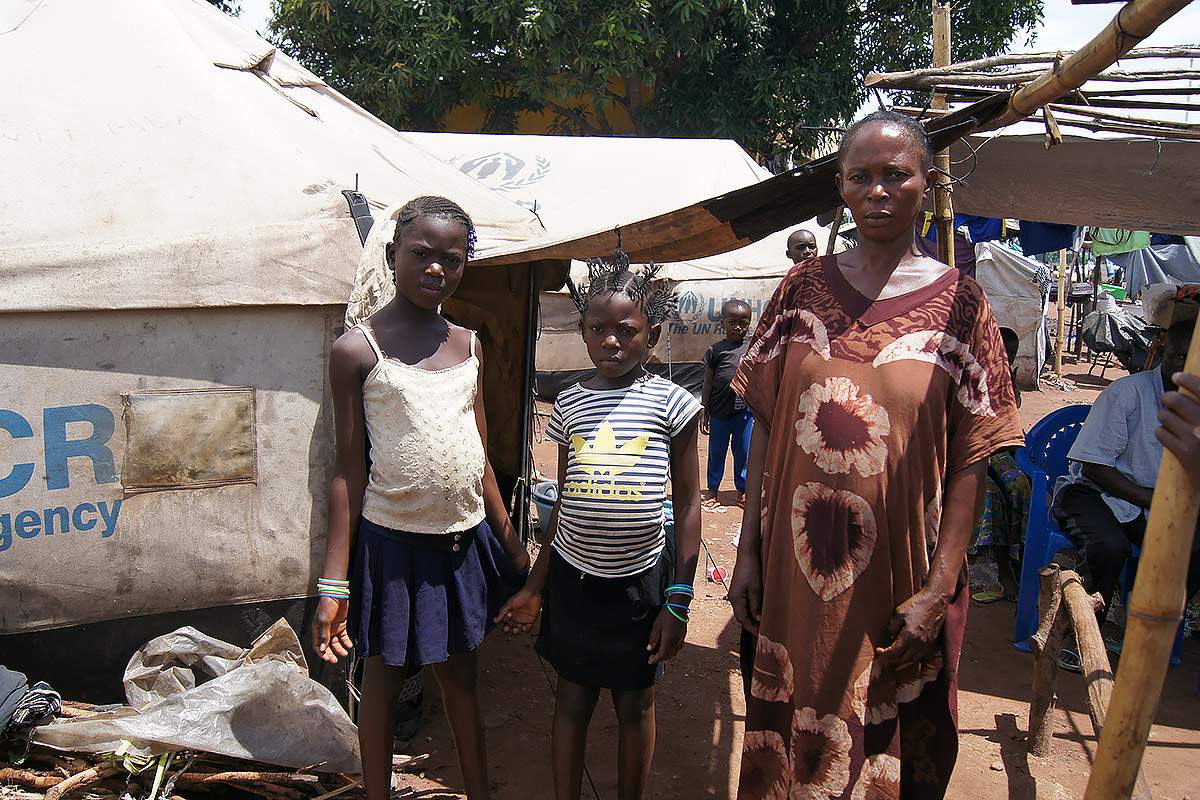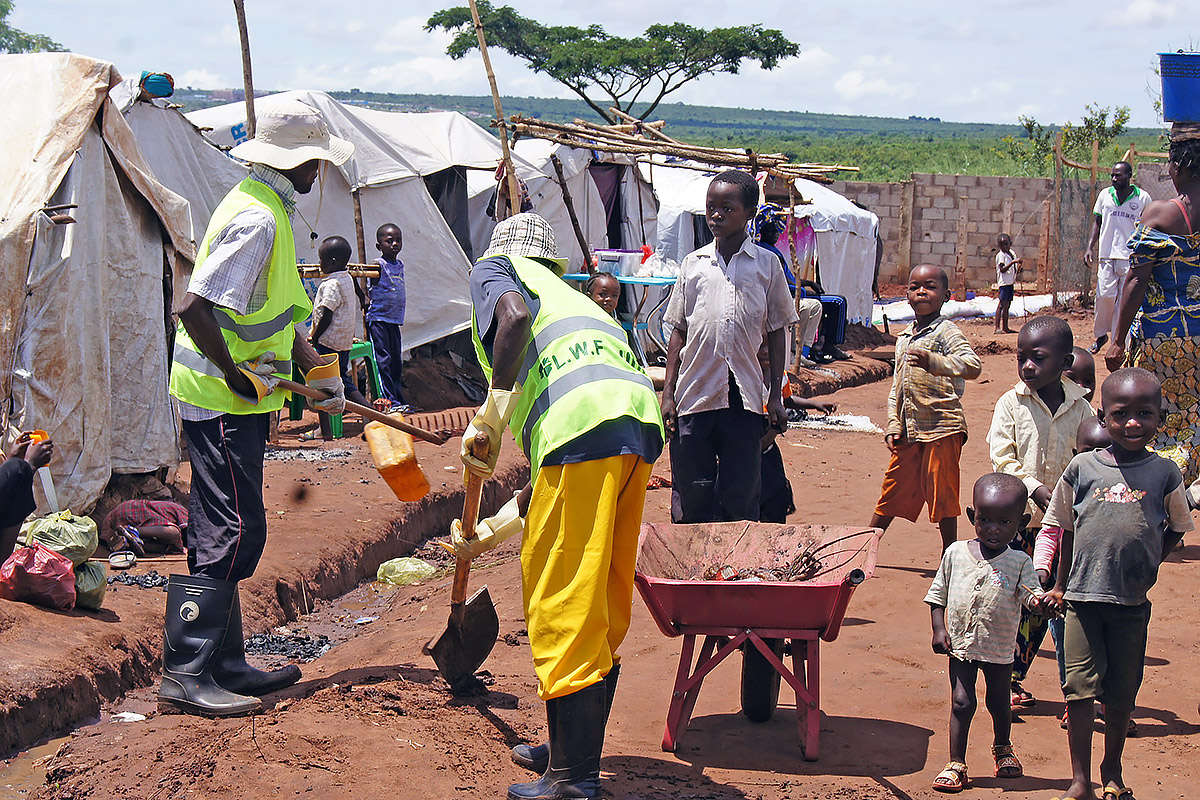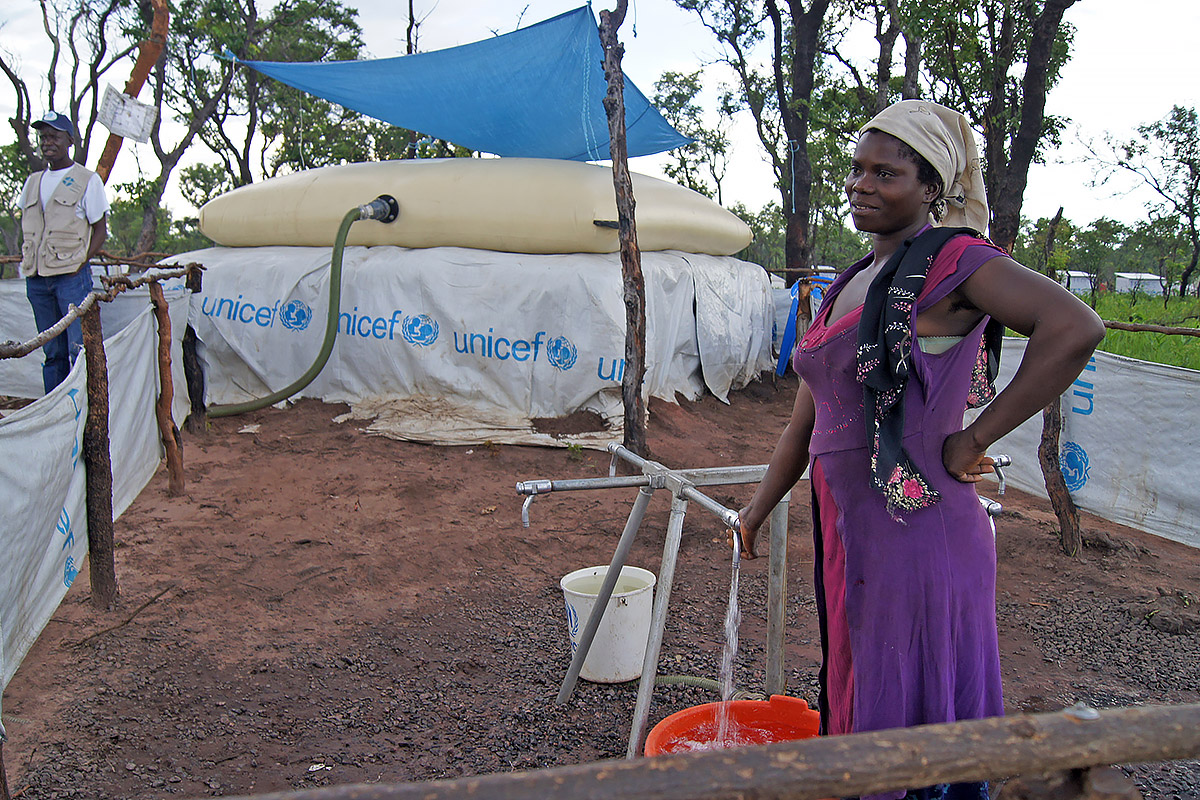
A woman carries water from a barehole installed by the LWF in Cacanda reception center, Northern Angola. Photo: LWF / C. Kästner
More funds needed to prevent outbreak of disease
Annie Ntumba is drying rice. The bag stood in an unprotected spot of the tent when the seasonal rains started, the precious food got wet. Now she and a neighbor are on their knees, spreading the white grain over a tarpaulin in the Cacanda reception center near Dundo, Northern Angola. Their wet food is just one indicator of the situation in the camp: Many people struggle to keep their goods in a clean and dry place.

Annie Ntumba and her daughters in front of their tent in Cacanda reception center. The army tent is leaking, which causes problems of sanbitation now that the rainy season started. Photo: LWF / C. Kästner
It is a hot, sunny sunday, people walk past in their Sunday best to attend one of the many church services which can be heard all over the refugee camp. But not even their polished shoes and white shirts can mask the smell or the dirt which have become a landmark of the overcrowded camp.
Too many people, too little space
The reception center hosts more than 20,000 refugees from Kasai, Democratic Republic of Congo (DRC). Following a disputed election, violence broke out in Kasai province, an opposition stronghold in DRC. Civilians were targeted by militia, sometimes just because they worked for the government or in a government institution. Since May 2017, more than 33,000 have fled to Northern Angola, 75 percent of them women and children.
They now live in Dundo town or in Cacanda reception center, where "too many people have been put into too little space," as a staff member of The Lutheran World Federation (LWF) puts it. Still the population of the reception center is growing. Lack of resources in urban settings, police raids who catch refugees from the streets in Dundo and family reunification are but some of the reasons for the refugees to come to a place which by many is considered far from optimal.
"We have a sanitary problem here," says Ngosa Jean-Pierre Mbombo, president of the refugees living here and intermediary with government and non-government agencies. "It's too confined, 100 people have already died of sickness. We have cases of malaria and diarrhea and always fear the outbreak of an epidemy."
LWF volunteers to clean the camp
The reason why it has not yet come to this is a group of young men and women in yellow vests, LWF volunteers, who clean the camp every day. They collect the garbage, clear the surface drains at the sides of the mud roads and remind people of basic hygiene measures. LWF, in charge of water and sanitation, has set up water points and latrines and engaged refugees to help clean up the camp.
"There is a lot of rubbish, but the situation here has improved a lot since we started cleaning every day," says Alexi Ntseka, one of the volunteers.
At home, everybody had a hole in their compound to put the rubbish. There is no space here for that. Also, in this crowded camp, nobody will know it was you who threw the rubbish into the street.
"Sometimes people just throw it into the street instead of putting it into their containers." His colleague Alen Kazadi blames the overcrowded camp for the people's attitude. "At home, everybody had a hole in their compound to put the rubbish. There is no space here for that. Also, in this crowded camp, nobody will know it was you who threw the rubbish into the street."

LWF volunteers clean the surface drains at the side of the camp roads. Photo: LWF / C. Kästner
Long-term solution: new camp
To relieve the situation in Cacanda, the government of Angola is setting up a new site in Lovua where the refugees will be relocated. 3,400 refugees have already moved and begun to set up plots and villages. They still live in tents, but there is space for each family to plant a vegetable garden, a shower and in some cases their own latrine.
LWF is among the agencies preparing the camp. The team has opened up secondary roads and built latrines and water points, where water trucks deliver 160,000 cubic metres every day.

A woman fetches water in the newly established Lovua camp. LWF had installed water bladders like the one in the background and together with partner Norwegian Church Aid, trucks up to 160,000 cubic metres of water every day. Photo: LWF / C. Kästner
Water supply is not the only challenge, every square meter has to be wrested from the bush. As the entire Cacanda camp is supposed to move here by the end of March 2018, it has become a race against the clock, says Geoffrey Kakaule, LWF team leader in Dundo.
More than sanitation
"We have so far installed 72 latrines, 72 showers 60 garbage pits and water points in 9 villages (parts of the camp)", he says. "We need to find a more sustainable solution for the water supply, however, and more funds to provide adequate sanitation." At the moment however, the LWF team is ahead of schedule. While the relocations from Cacanda have slowed down due to a lack of shelter, there are already latrines built along the dirt road of what might soon become the next village of Lovua.

A child takes a bath in Cacanda reception center. Children are most at risk from poor sanitation and waterborne diseases. Photo: LWF / C. Kästner
The volunteers in the yellow vests can be found in Lovua as well, but some of them are doing things differently. Rather than delivering dry explanations about handwashing and the proper use of a pit latrine, “mobilizers” Kalubi Mitterand and Mbayi Kueno have painted their faces with white chalk, donned dresses and wigs and oversized glasses. They call themselves the "Babule International todo mundo" they visit compounds and camp assemblies and deliver the message of sanitation through a clown performance. "People need sanitation, yes," says Mitterand, "but they also need to laugh and a relief from stress."
In Cacanda, LWF constructed 9 twin latrines and 9 twin showers through the ACT forum appeal funds. The LWF sanitation work in Lovua camp in funded by UNICEF.


